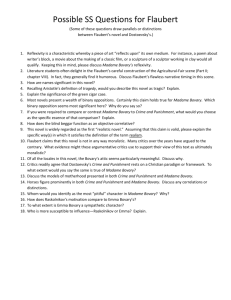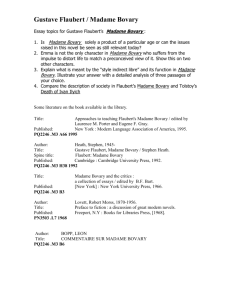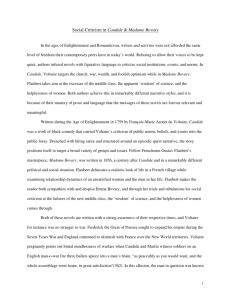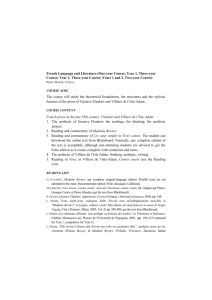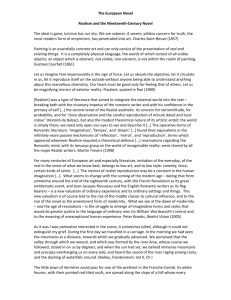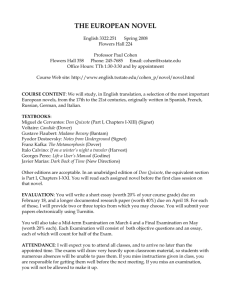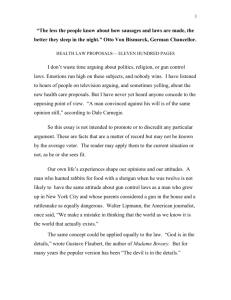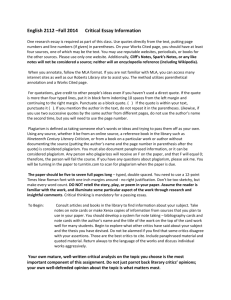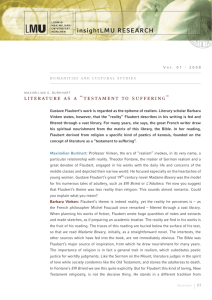Madame Bovary Paper - Nevermindthebllcks
advertisement
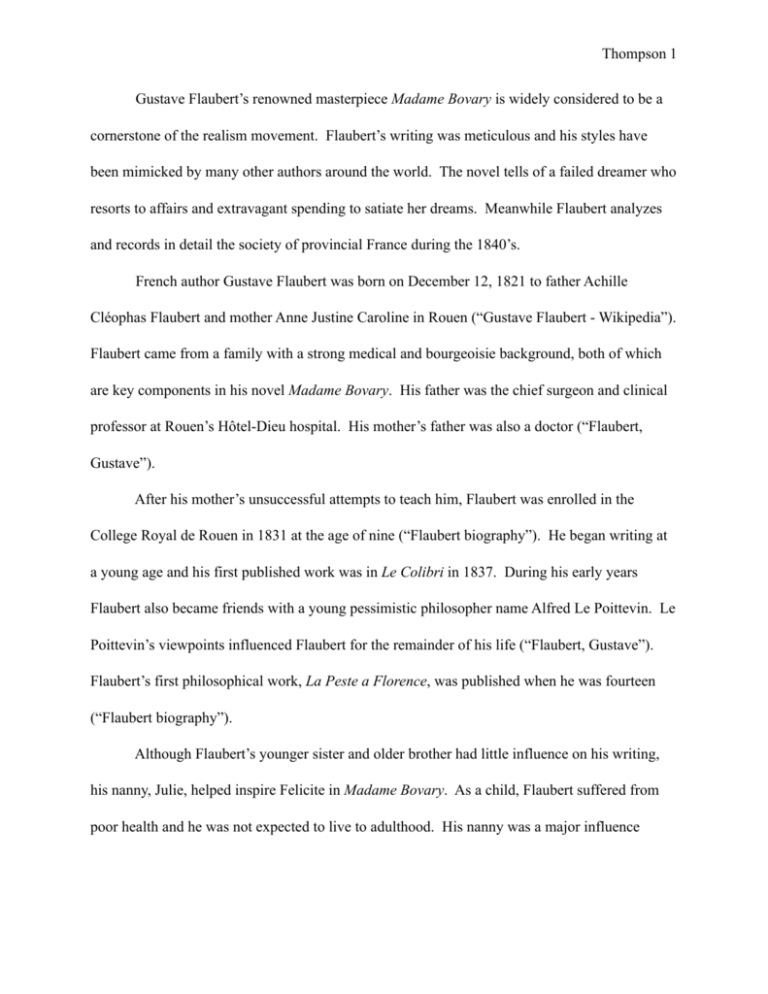
Thompson 1 Gustave Flaubert’s renowned masterpiece Madame Bovary is widely considered to be a cornerstone of the realism movement. Flaubert’s writing was meticulous and his styles have been mimicked by many other authors around the world. The novel tells of a failed dreamer who resorts to affairs and extravagant spending to satiate her dreams. Meanwhile Flaubert analyzes and records in detail the society of provincial France during the 1840’s. French author Gustave Flaubert was born on December 12, 1821 to father Achille Cléophas Flaubert and mother Anne Justine Caroline in Rouen (“Gustave Flaubert - Wikipedia”). Flaubert came from a family with a strong medical and bourgeoisie background, both of which are key components in his novel Madame Bovary. His father was the chief surgeon and clinical professor at Rouen’s Hôtel-Dieu hospital. His mother’s father was also a doctor (“Flaubert, Gustave”). After his mother’s unsuccessful attempts to teach him, Flaubert was enrolled in the College Royal de Rouen in 1831 at the age of nine (“Flaubert biography”). He began writing at a young age and his first published work was in Le Colibri in 1837. During his early years Flaubert also became friends with a young pessimistic philosopher name Alfred Le Poittevin. Le Poittevin’s viewpoints influenced Flaubert for the remainder of his life (“Flaubert, Gustave”). Flaubert’s first philosophical work, La Peste a Florence, was published when he was fourteen (“Flaubert biography”). Although Flaubert’s younger sister and older brother had little influence on his writing, his nanny, Julie, helped inspire Felicite in Madame Bovary. As a child, Flaubert suffered from poor health and he was not expected to live to adulthood. His nanny was a major influence Thompson 2 during this stage of his life and was the source of his future confidence in life (“Flaubert biography”). As a child and teenager, Flaubert was eager for life and learning. It was also during this period that he developed his radical life-long philosophy. Throughout his life he opposed all authority and accepted values as he focused on the injustices of man. He also showed sympathy towards people in low positions as he despised the privileged (“Flaubert biography”). Flaubert became a student at the Faculty of Law in Paris in November 1841. However, at the age of twenty-two in 1842 his studies withered as he suffered from laziness and epilepsy. Despite the absence of epilepsy’s main symptoms, the disorder affected him for the rest of his life (“Flaubert, Gustave” and “Flaubert biography”). After leaving law school Flaubert devoted the remainder of his life to writing and literature. After his father and sister died in January and March, respectively, of 1846, Flaubert moved to his estate at Croisset, in France, with his mother and infant niece (“Flaubert, Gustave”). Over the following years Flaubert wrote his most famous pieces such as Mémoires d’un fou, Salammbô, L’Éducation sentimentale, Trois contes, and his masterpiece Madame Bovary. Flaubert died twenty-four years after Madame Bovary’s publication on May 8, 1880 at Croisset (“Gustave Flaubert - Wikipedia”). Flaubert created his own literary movement with his meticulous and detailed writing. Described as a “novelist’s novelist,” Flaubert’s independently created writing style was mimicked by other authors such as Marcel Proust, James Joyce, and Chekhov (“Flaubert biography”). He is widely considered to be a romantic and realist author (“Gustave Flaubert Wikipedia”). Writing during the age of romanticism, Flaubert’s works captured the literary Thompson 3 movement’s ideas of personal examination and a focus on passions over reason and intellect (“Romanticism”). Many of Flaubert’s writings were carefully crafted literary works depicting life in provincial France. Although many of his writings could be considered scientific documentations of daily French life due to his intense attention to detail, Flaubert’s Madame Bovary, published in 1856, also included a story line that told the life of an “unfulfilled dreamer.” The inclusion of a time period-neutral story helps Madame Bovary appeal to almost all audiences (“Madame Bovary,” Norton 823-24). Although Flaubert’s works give an objective view of society, they are heavily influenced by his personal experiences and observations (“Madame Bovary,” Norton 823). Flaubert remains an influential novelist today as many authors use his self-created style in their works. His writing was also very influential in helping shape the movement in naturalistic writing (“Flaubert biography”). Flaubert is also a domineering figure in the realm of realist writing due to his careful documentation of provincial French life in his writings (“Flaubert, Gustave”). Madame Bovary is widely regarded as Flaubert’s best literary work. The novel, which consumed five-years of his life, helped start a new theme in literature (“Madame Bovary,” Norton 823). His careful documentation of provincial life compelled authors to write in a similarly realistic manner (“Flaubert biography”). Flaubet’s novel opens with Charles Bovary as an adolescent in a new school. The novel quickly overviews Charles’s education and first marriage, which ended in his wife’s death. Shortly before her death, Charles, a less prestigious French doctor, becomes acquainted with the Thompson 4 daughter, Emma Rouault, of one of his clients. A casual, but loving, relationship ensues. Shortly after his wife’s death, Charles whisks Emma away into marriage. Although their marriage is passionate at first, Emma soon ventures down a path of dreaming and longing for what is out of her reach. This will ultimately lead to her suicide. Emma’s longing for Paris, its lifestyle, and its culture become permanent as she attends a fancy ball at La Vaubyessard. After returning to life in the small village of Tostes, Emma becomes depressed. Charles relocates to the larger town of Yonville in hopes of improving her spirits. It is in Yonville that most of Madame Bovary’s plot takes place. She gives birth to her daughter, Berthe, who she largely ignores. It is also here that she meets young Léon Dupuis, a notary’s clerk, who has similar big city aspirations. Their relations are postponed after he moves to Paris to attend law school. Emma then begins an affair with the debonair Rodolphe Bourlanger. Emma enters a deep depression after their visits end two-years later. Emma is pulled from her bout of depression when Léon Dupuis moves to nearby Rouen. Under the guise of music lessons, Emma makes weekly journeys to the city to have an affair with Léon. Emma’s second, and last, affair will end when her surmounting debts reach their tipping point. Combined with the end of her affair and repossession of her home’s furnishings, Emma commits suicide by ingesting arsenic. Charles will prematurely die from grief after Emma’s death. Berthe is sent to live with a distant aunt and work in a cotton mill. Although a dominant theme remains ambiguous in Madame Bovary, pursuing one’s dreams and desires motivates the main character Emma Bovary (“Madame Bovary,” Norton 824). Therefore, it can be strongly argued that Flaubert’s main theme compares and contrasts our Thompson 5 dreams and reality. Also, while the novel does not expose Flaubert’s philosophy on society and religion, it does take a stance on the bourgeoise and Christianity. Emma was a dreamer who failed to achieve her dreams because of societal constraints and self-constraints (“Madame Bovary,” Norton 824). Throughout her life she had dreamed of romances and the society in cities such as Paris. However, every advance Emma made towards achieving her goal pushed her further into alternating cycles of depression, happiness, and selfpity. The major theme of achieving life-long dreams throughout the novel is also a jumping off point for Flaubert to explore other topics of interest in the society of provincial France in the 1840’s. One such ability of Flaubert is to show the stereotypical characters in society during this time period. Yonville’s pharmacist represented the rapidly advancing world of science in the 1800’s and, in some cases, its carelessness. Meanwhile, Flaubert also hints at the occasionally deceiving practices of cunning businessmen. He also uses Emma to examine the bourgeoisie's delusion that material wealth would increase their happiness (“Madame Bovary - Wikipedia”). Christianity and religion also becomes a predominate theme as the novel progresses. Flaubert uses Yonville’s priest and the actions of its citizens to show the true religious nature of the average person. His comparison of religion with science also shows where society has been and where it is going in terms of enlightened thinking (“Madame Bovary - Wikipedia”). Although Flaubert does not use Madame Bovary to espouse his philosophical views, it closely parallels his life. Therefore, while the book was heavily influenced by his ideas on lifestyle and society, its main intent was not to showcase Flaubert’s views. He stated that Thompson 6 “Madame Bovary is me” (“Madame Bovary,” Norton 826). The novel is a detailed analysis of the society surrounding Flaubert and, therefore, has been influenced by his ideas on society. Emma had a life-long dream that she believed would make her happier. However, every time she advanced further towards her dream the unhappier she became. As a teenager in a convent and later at her father’s farm she read romance novels that inflated her ideals of life and its happiness. Initially these books were her only method of indulging her dreams. When she met and later married Charles, Emma was filled with bliss and was one step closer to her life-long goal. However, after the novelty faded Emma fell into a torpor. She was no longer as interested in Charles. Instead books and magazines about life in Paris helped further her dream. After moving to Yonville Emma’s depression subsided because she was another step closer to realizing this dream. What she did not know was that this was only the second revolution of her cycle of depression, happiness, and self-pity. This cycle took her through two separate affairs. Emma would purchase the best goods and home furnishings from the local salesman in an attempt to further her dream. Instead it caused enormous debt. With each additional cycle Emma became more and more trapped, ultimately resulting in her suicide. Although part of her failed dreams were a result of being trapped in a small provincial town without an escape, she also suffered from mental instabilities. Instead of coping with the matter like a rational human, Emma resorted to activities that only worsened her desire to live in Paris and mingle with the vibrant society and everything else she did not have. As Emma was attempting to fulfill her dreams Flaubert was painting a picture of society in the 1800’s. Yonville’s pharmacist, Monsieur Homais, represented the revolutionary advances Thompson 7 that were being made in the sciences. His constant reports of the latest treatments and hypothesis exemplify this. However, readers are also reminded that science and medicine were still a new and unexplored frontier. This is exemplified by the failed surgery that Charles performs, under Monsieur Homais’s persistence, to correct Hippolyte Tautain’s clubfoot (“Madame Bovary Wikipedia”). Flaubert also spotlights the deceiving words and actions of businessmen during the time period. Monsieur Lheureux constantly recommended and sold goods to Emma even though she was in increasingly more debt. He also purposely gave her too many loans so that he could collect their interest. However, Monsieur Lheureux’s actions also have another point-of-view. His transactions with Emma exemplify Flaubert’s disapproval of the Bourgeoisie's extravagant lifestyle (“Madame Bovary - Wikipedia”). As the novel progresses Flaubert begins to compare and contrast Christianity and science. The town’s priest symbolizes Christianity and Monsieur Homais symbolizes science. The priest, Abbé Bournisien, believes in conservative values and traditions. Meanwhile Monsieur Homais advocates progressive thinking and lifestyles. Flaubert also contrasts the “empty church rituals” with the potential breakthroughs of science (“Madame Bovary - Wikipedia”). In Flaubert’s closing statements in the novel he writes, “three doctors have succeeded one another in Yonville.” The novel concludes with “[Monsieur Homais] has just been awarded the cross of the Legion of Honor” (396). With those words Flaubert is alluding to the failure of the Holy Trinity and the future of science and enlightened thinking. Although Flaubert does not focus on one overarching theme in Madame Bovary, his analysis of society in provincial France during the 1800’s transcends generations. He brings to Thompson 8 his readers’ attention timeless aspects of society and life that engage their thought processes. Emma’s dreaming for what she does not have encourages readers to reexamine their desires. Flaubert’s critique of society compels his readers to critically think about their surroundings and take a second look at what they believe. Ultimately Flaubert and Madame Bovary provide their readers with a compelling story of love and hate, sadness and happiness while also focusing on how we view life and its meaning. Thompson 9 Works Cited Flaubert biography. 5 Apr. 2008. <http://www.springfield.k12.il.us/schools/southeast/ bovary/biography.htm>. "Flaubert, Gustave." Encyclopædia Britannica. 2008. Encyclopædia Britannica Online. 29 Mar. 2008 <http://search.eb.com/eb/article-2347>. Flaubert, Gustave. Madame Bovary. Trans. Francis Steegmuller. New York: Random House, 1957. Gustave Flaubert - Wikipedia, the free encyclopedia. 4 Apr. 2008. <http://en.wikipedia.org/wiki/Gustave_Flaubert>. “Madame Bovary.” Cyclopedia of Literary Characters. Ed. Frank Magill. New York: Harper & Row, 1963. “Madame Bovary.” The Norton Anthology of World Masterpieces. Ed. Maynard Mack. New York: Norton, 1985. 823-26. Madame Bovary - Wikipedia, the free encyclopedia. 6 Apr. 2008. <http://en.wikipedia.org/wiki/Madame_Bovary>. "Romanticism." Encyclopædia Britannica. 2008. Encyclopædia Britannica Online. 5 Apr. 2008 <http://nclive.lib.ncsu.edu:2221/eb/article-9083836>.
